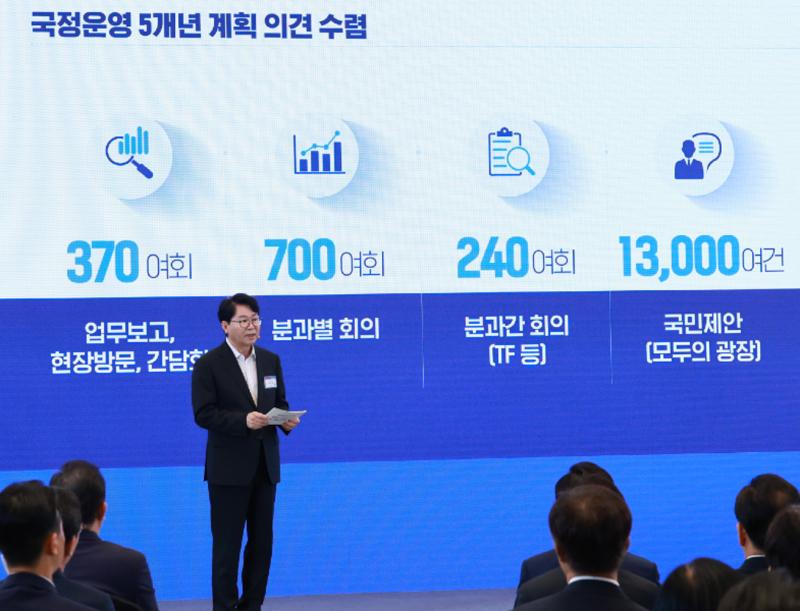
Lee Han-joo, head of the Presidential Commission on Policy Planning on Aug. 13 explains his agency's latest five-year administration plan at a news conference held at Yeongbingwan, the state guest house of Cheong Wa Dae in Seoul. (Yonhap News)
By Yoon Sojung
The five-year strategy for national governance of the Lee administration has been released.
This large-scale blueprint is focused on constitutional amendments, reform of power organizations, development of newly emerging sectors such as artificial intelligence (AI) and biohealth, accelerating decentralization of regions, diplomacy stressing national interests, and peace on the Korean Peninsula.
The Presidential Commission on Policy Planning (PCPP) on Aug. 13 released the plan at a briefing held at Yeongbingwan, the state guest house of Cheong Wa Dae in Seoul. The agenda announced comprised a national vision, three principles of administration, five goals and 123 policy tasks.
The national vision is "A nation where the people rule, a Republic of Korea where everyone is happy" and the three key principles are listening and integration; fairness and trust; and practicality and results.
The five national goals are politics that unite the people; a world-leading innovative economy; balanced growth that ensures that all prosper; a society with strong fundamentals; and diplomacy and security focused on national interests. To achieve these objectives, the PCCP selected 123 national tasks and 23 implementation strategies.
The first task is constitutional amendment. The commission pledged to "create a new constitutional system that embodies the constitutional spirit of the people's sovereignty," proposing reforms like those of powerful institutions such as the prosecution, police, and the Board of Audit and Inspection; prohibiting military intervention in politics; and improving the governance structure of public broadcasting.
To build an innovative economy, the PCPP proposed the development of new industries such as AI and biohealth and promoting energy transformation to overcome low growth. The recommended projects for this purpose included an AI highway, next-generation AI semiconductors, innovation of chips and secondary batteries, recruitment of top-level talent and public release of shared data.
For balanced national growth, the commission will focus on shared development of metropolitan and suburban regions; large and small businesses; and labor and management. It will achieve this through stronger decentralization of regions; connection of metropolitan transportation networks; completion of the administrative capital in Sejong; more public housing; launch of a basic income system for farming and fishing villages; and expansion of public health care.
In diplomacy and security, the plan stressed national interests and peace on the Korean Peninsula, with an eye on making the nation one of the world's top four in the defense industry and pursuing inter-Korean reconciliation and cooperation on a systematic basis.
Twelve key strategic tasks will also include raising the benchmark Korea Composite Stock Price Index, aka KOSPI, to 5,000; making Korea one of the world's top three AI nations; creating a society that cares for its people's lives; becoming a top five global cultural power; and responding to the demographic crisis.
To effectively accomplish its policy tasks, the PCPP announced its launch of a national future strategy committee to review, inspect and complement overall implementation of such objectives.
arete@korea.kr